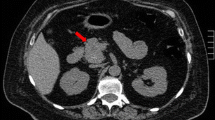Abstract
Pituitary adrenocorticotropic hormone-dependent Cushing’s syndrome due to ectopic production of corticotropin-refeasing hormone (CRH) or bombesin (gastrin-releasing peptide) is an extremely rare cause of pituitary adrenocorticotropic hormone (ACTH) hypersecretion. We report a patient with elevated ACTH and cortisol levels due to ectopic secretion of both bombesin and CRH by metastatic medullary carcinoma of the thyroid (MCT). A 45-year-old man was investigated because of diabetes insipidus and visual field disturbances due to suprasellar metastasis of the MCT. On physical examination, he was a chronically ill man with a body mass index of 18.5 and was darkly pigmented but without other features typical of Cushing’s syndrome. Hypogonadotropic hypogonadism, thyroid-stimulating hormone (TSH) deficiency, and hyperprolactinemia were due to pituitary stalk disorder, in light of these deficiencies, we were surprised to find elevated plasma ACTH, cortisol, and growth hormone (GH) levels throughout the day. Plasma ACTH at 9am was 118 pg/ml and plasma cortisol was 859 nmol/L. At 12pm, ACTH was 89 pg/ml whereas plasma cortisol was 540 nmol/L. Urinary 17 OH CS were elevated (38 nmol/24 hr). The mean of the four-point day curve for GH was elevated. Plasma electrolytes were normal. The presence of both CRH and bombesin was documented by immunocytologic studies in the metastases (lymph node and suprasellar biopsy). ACTH was not found in any of the metastases. Because of the close proximity of the suprasellar metastasis to the portal pituitary circulation, CRH and bombesin could have been readily provided to the pituitary corticotrophs.
Similar content being viewed by others
References
Abe K, Yamaguchi K, Adachi I, Masafumi S, Kimura S, Akihiko S, Kaname M, Yanaihara N. In: Labrie F, Proux L, eds. Endocrinology. Proceedings of the Seventh International Congress of Endocrinology, Quebec City, July 1-7, 1984. Amsterdam: Excerpta Medica, 1984. p 77.
Belsky J, Cuello B, Swanson L, Simmons D, Jarett R, Braza F. Cushing’s syndrome due to ectopic production of corticotropin-releasing factor. J Clin Endocrinol Metab 60:496, 1985.
Birkenhager J, Upton V, Selenrath J, Krieger D, Tashjian A. Medullary thyroid carcinoma ectopic production of peptides with ACTH like corticotrophin-releasing factor and prolactin production stimulating activities. Acta Endocrinol (Copenh) 83:280, 1976.
Carey R, Varma S, Drake C, Thorner M, Kovacs K, Rivier J, Vale W. Ectopic secretion of corticotropin releasing factor as a cause of Cushings syndrome: a clinical, morphologic and biochemical study. N Engl J Med 311:13, 1984.
Christofides M, Stephanou A, Suzuki H, Yiangou Y, Bloom S. Distribution of immunoreactive growth hormone releasing hormone in human brain and intestine and its production by tumors. J Clin Endocrinol Metab 50:747, 1984.
Frohman L, Jansson J. Growth hormone-releasing hormone Endocr Rev 7:223, 1986.
Howlett T, Grossman A, McLoughlin L, Perry L, White A, Coy D, Rees L, Besser GM. The effect of ovine corticotrophin-releasing factor on the hormonal response to insulin-induced hypoglycaemia. Clin Endocrinol (Oxf) 30:185, 1989.
Howlett T, Price J, Hale A, Doniach I, Rees L, Wass J, Besser GM. Pituitary ACTH dependent Cushing’s syndrome due to ectopic production of bombesin-like peptide by a medullary carcinoma of the thyroid. Clin Endocrinol (Oxf) 22:910, 1985.
Miauchi A, Endo K, Hitoya M, Ohta H, Torzuka K, Matsuzuka F, Kobayashi A, Kuma K, Maeda M. 99mTc (V) dimercaptosuccinic acid scintigraphy for medullary carcinoma of the thyroid. World J Surg 10:640, 1986.
Price J, Nieuwenhuijzen K, Doniach I, Howlett T, Besser GM, Rees L. Bombesin like peptides in human endocrine tumors: quantitation, biochemical characterization and secretion. J Clin Endocrinol Metab 60:1097, 1985.
Suda T, Kondo M, Totani R, Hashimoto N, Suzuki M, Imaki T, Oba Y, Tomori N, Yajima T, Suimoto T, Nakogami Y, Ushiyama T, Demura H, Shizume M. Ectopic ACTH syndrome caused by lung cancer that responded to CRF. J Clin Endocrinol Metab 63:1047, 1986.
Author information
Authors and Affiliations
Rights and permissions
About this article
Cite this article
Popovic, V., Milosevic, Z., Doniach, I. et al. Elevated adrenocorticotropic hormone and cortisol levels in a patient with medullary carcinoma of the thyroid containing ectopic immunoreactive corticotropin-releasing hormone and bombesin. Endocr Pathol 2, 56–60 (1991). https://doi.org/10.1007/BF02915326
Published:
Issue Date:
DOI: https://doi.org/10.1007/BF02915326




